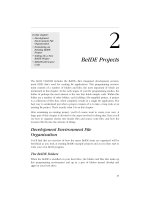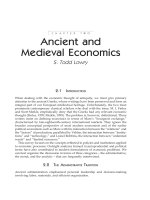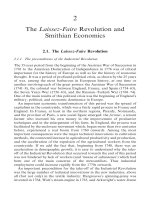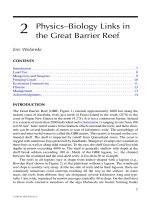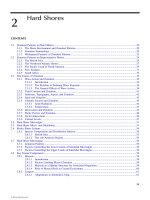The transformed school counselor chapter 2
Bạn đang xem bản rút gọn của tài liệu. Xem và tải ngay bản đầy đủ của tài liệu tại đây (791.84 KB, 31 trang )
Counseling Theory in Schools
The Transformed School Counselor
Chapter 2
©2012 Cengage Learning. These materials are designed for classroom use and can be used for educational purposes only. Reproduction for commercial use is in violation of
copyright laws.
Defining Counseling
“a professional relationship that empowers
diverse individuals, families, and groups to
accomplish mental health, wellness,
education, and career goals" (American
Counseling Association, 2010).
Counseling is a process of helping people by
assisting them in making decisions and
changing behavior (ACA, 1997).
©2012 Cengage Learning. These materials are designed for classroom use and can be used for educational purposes only. Reproduction for commercial use is in violation of
copyright laws.
Defining School Counseling
……..a helping process implemented by trained and
credentialed personnel which involves a variety of
strategies and activities that help students explore,
academic, career and personal/social issues which can
impede healthy development or academic progress
(ASCA, 2005).
………is a confidential relationship which the counselor
conducts with students individually and in small groups to
help them resolve their problems and developmental
concerns (ASCA, 1999)
©2012 Cengage Learning. These materials are designed for classroom use and can be used for educational purposes only. Reproduction for commercial use is in violation of
copyright laws.
Defining School Counseling
A profession that focuses on the relations and
interactions between students and their school
environment with the expressed purpose of
reducing the effect of environmental and
institutional barriers that impede student
academic success (Education Trust, 1997).
©2012 Cengage Learning. These materials are designed for classroom use and can be used for educational purposes only. Reproduction for commercial use is in violation of
copyright laws.
The Foundation for Comprehensive School
Counseling
Counseling is a process of helping people by
assisting them in making decisions and changing
behavior.
School counselors work with all students, school
staff, families and members of the community as an
integral part of the education program.
School counseling programs promote school
success through a focus on academic achievement,
prevention and intervention activities, advocacy and
social/emotional and career development.
American School Counselor Association, 1997
©2012 Cengage Learning. These materials are designed for classroom use and can be used for educational purposes only. Reproduction for commercial use is in violation of
copyright laws.
….and Professional Identity
The foundation and basis for the school
counseling program reside in counseling
theory and those processes and techniques
relevant to the school setting and the one by
which the counselor’s professional identity
is often established.
©2012 Cengage Learning. These materials are designed for classroom use and can be used for educational purposes only. Reproduction for commercial use is in violation of
copyright laws.
How are these Different or Similar?
Counseling and
advising
guidance
therapy
©2012 Cengage Learning. These materials are designed for classroom use and can be used for educational purposes only. Reproduction for commercial use is in violation of
copyright laws.
Purpose of Counseling
Five major goals are at the heart of most counseling
theories and models (George and Cristiani , 1990):
1990
1. facilitate a change in behavior;
2. improve social and personal relationships;
3. increase one’s ability to cope;
4. learn and apply the decision making process; and,
5. enrich personal growth and self development.
How do you apply these in a school setting?
©2012 Cengage Learning. These materials are designed for classroom use and can be used for educational purposes only. Reproduction for commercial use is in violation of
copyright laws.
The Counseling Process
Theory
Technique
Application
©2012 Cengage Learning. These materials are designed for classroom use and can be used for educational purposes only. Reproduction for commercial use is in violation of
copyright laws.
Know Thyself (self awareness)
Reflect on the personal qualities that a school
counselor should possess to successfully
engage students in the counseling process.
Which qualities do you need to further
develop?
How will you do this?
©2012 Cengage Learning. These materials are designed for classroom use and can be used for educational purposes only. Reproduction for commercial use is in violation of
copyright laws.
Exploring 10 Theoretical Applications
for School Settings
1. The Gestalt Approach
2. The Person-Centered Approach
3. The Individual Psychology Approach
4. The Behavioral Approach
5. The Reality Therapy Approach
©2012 Cengage Learning. These materials are designed for classroom use and can be used for educational purposes only. Reproduction for commercial use is in violation of
copyright laws.
Exploring Theoretical Applications,
cont.
6. The REBT (Rational Emotive Behavior
Therapy) Approach
7. The Cognitive Behavior Approach
8. The Existential Approach
9. Motivational Interviewing
10. Solution Focused Counseling
©2012 Cengage Learning. These materials are designed for classroom use and can be used for educational purposes only. Reproduction for commercial use is in violation of
copyright laws.
Gestalt Theory
Gestalt theory emphasizes the present and
supports the equation now = experience =
awareness = reality (Fritz Perls).
Dream Work
Empty Chair
Confrontation
Making the Rounds
I Take Responsibility
©2012 Cengage Learning. These materials are designed for classroom use and can be used for educational purposes only. Reproduction for commercial use is in violation of
copyright laws.
Person Centered Theory
Person Centered theory focuses on the
“core conditions” of genuineness, empathy,
positive regard, active listening and
concreteness all of which are considered
universally essential to all helping
relationships and the counseling process
(Rogers).
Three stages: non directive, reflective,
experimental
©2012 Cengage Learning. These materials are designed for classroom use and can be used for educational purposes only. Reproduction for commercial use is in violation of
copyright laws.
Individual Psychology
Individual Psychology (Adlerian Counseling)
encourages the client to be well aware of his/her
surroundings and environment, and supports healthy
development to overcome any feelings of inferiority.
The client learns to grapple with his/her conscious
levels of thought and is responsible for taking charge of
changing behaviors.
Empathy
Support
Confrontation
Pushing buttons
©2012 Cengage Learning. These materials are designed for classroom use and can be used for educational purposes only. Reproduction for commercial use is in violation of
copyright laws.
Behavioral Theory
Behavioral: is strongly influenced by the work of B.F.
Skinner and is based on processes closely associated with
overt behavior. Behavioral theory works with the premise
that all behavior is learned and that learning is effective in
changing maladaptive behavior.
Environmental planning
Systemic desensitization
Assertiveness training
©2012 Cengage Learning. These materials are designed for classroom use and can be used for educational purposes only. Reproduction for commercial use is in violation of
copyright laws.
Reality Theory
Reality Theory encourages the client to learn how to make
more effective choices and develop the skills to cope with
daily stresses and problems. Individuals set realistic and
take ownership of goals, thus accepting responsibility for
their choices in life and to obtain what they want in the
present and future (William Glasser).
Role play
Confrontation
Humor
Goal setting
Attending
Teaching
WDEP (wants, direction, evaluation, plan)
©2012 Cengage Learning. These materials are designed for classroom use and can be used for educational purposes only. Reproduction for commercial use is in violation of
copyright laws.
Rational Emotive Behavior Theory
REBT helps people live balanced, productive, and
more rational lives by limiting the demands that one
makes on oneself. This theory concentrates on the
relationship between thoughts and their impact and
affect upon emotions and behaviors (Ellis).
Techniques such as teaching and disputing help
school counselors educate students on the anatomy
of emotion. Feelings are viewed as a result of
thoughts and not events.
©2012 Cengage Learning. These materials are designed for classroom use and can be used for educational purposes only. Reproduction for commercial use is in violation of
copyright laws.
Cognitive Behavioral Therapy
Cognitive behavioral therapy assists clients in
being able to deal with life and accomplish
personal and professional goals (Bandura).
Reinforcers
Behavior modification
Shaping
Generalization, Maintenance, Extinction
©2012 Cengage Learning. These materials are designed for classroom use and can be used for educational purposes only. Reproduction for commercial use is in violation of
copyright laws.
Existensialism
Existentialism - emphasizes the importance of
examining anxiety, values, freedom and
responsibility to find meaning. Since people
destine or author their lives by the choices they
make, life’s choices do not depend on the
judgment of others. The client uncovers life’s
meaning by doing a deed, experiencing a value, or
by suffering (Frankl, May).
Philosophy or Therapy
Issues are learning experiences.
Accept the truth and work through ambiguity
©2012 Cengage Learning. These materials are designed for classroom use and can be used for educational purposes only. Reproduction for commercial use is in violation of
copyright laws.
Motivational Interviewing
Motivational Interviewing is defined as directive,
client-centered, and eliciting change by helping
clients explore and resolve ambivalence (Miller &
Rollnick, 2002). The counselor serves in the role of
collaborator with the client and helps counselors
work with students who fluctuate between
incongruent thoughts and behaviors (Biles & Eakin,
2010).
4 basic techniques: expressing empathy, developing a
discrepancy, rolling with resistance and support selfefficacy.
©2012 Cengage Learning. These materials are designed for classroom use and can be used for educational purposes only. Reproduction for commercial use is in violation of
copyright laws.
Solution Focused Counseling
In solution-focused counseling the school
counselor becomes the learner, and in turn, the
student assumes the role of teacher or informant,
telling you what the problem is and when a
workable solution has been created (Davis &
Osborne)
©2012 Cengage Learning. These materials are designed for classroom use and can be used for educational purposes only. Reproduction for commercial use is in violation of
copyright laws.
Brief Solution-Focused Counseling
Helps students to gain control and experience success.
Students can assess the problem in concrete and
developmentally appropriate terms, explore attempts
previously used to correct the problem, establish short
terms goals and implement the intervention (Bruce,
1995).
Techniques include: counting on change, highlighting
exceptions, the miracle question, the great instead,
establishing measurable goals and using scaling
questions.
©2012 Cengage Learning. These materials are designed for classroom use and can be used for educational purposes only. Reproduction for commercial use is in violation of
copyright laws.
Selecting a Theoretical Orientation
Counseling theories provide a point of
reference from which the counselor
develops a personal perspective of human
growth, development and behavior.
Counselors must recognize and choose the
appropriate behaviors and strategies that
best match their theoretical approach
©2012 Cengage Learning. These materials are designed for classroom use and can be used for educational purposes only. Reproduction for commercial use is in violation of
copyright laws.
Applying Counseling Skills and
Techniques
Establishing a Relationship
Setting the Tone in a Counseling Setting
Exploring the Issues
Setting Goals
Transitioning to Independence
©2012 Cengage Learning. These materials are designed for classroom use and can be used for educational purposes only. Reproduction for commercial use is in violation of
copyright laws.

